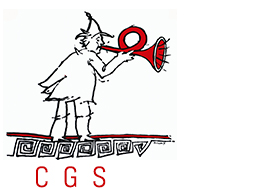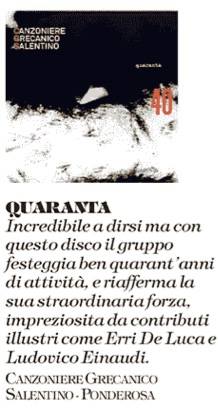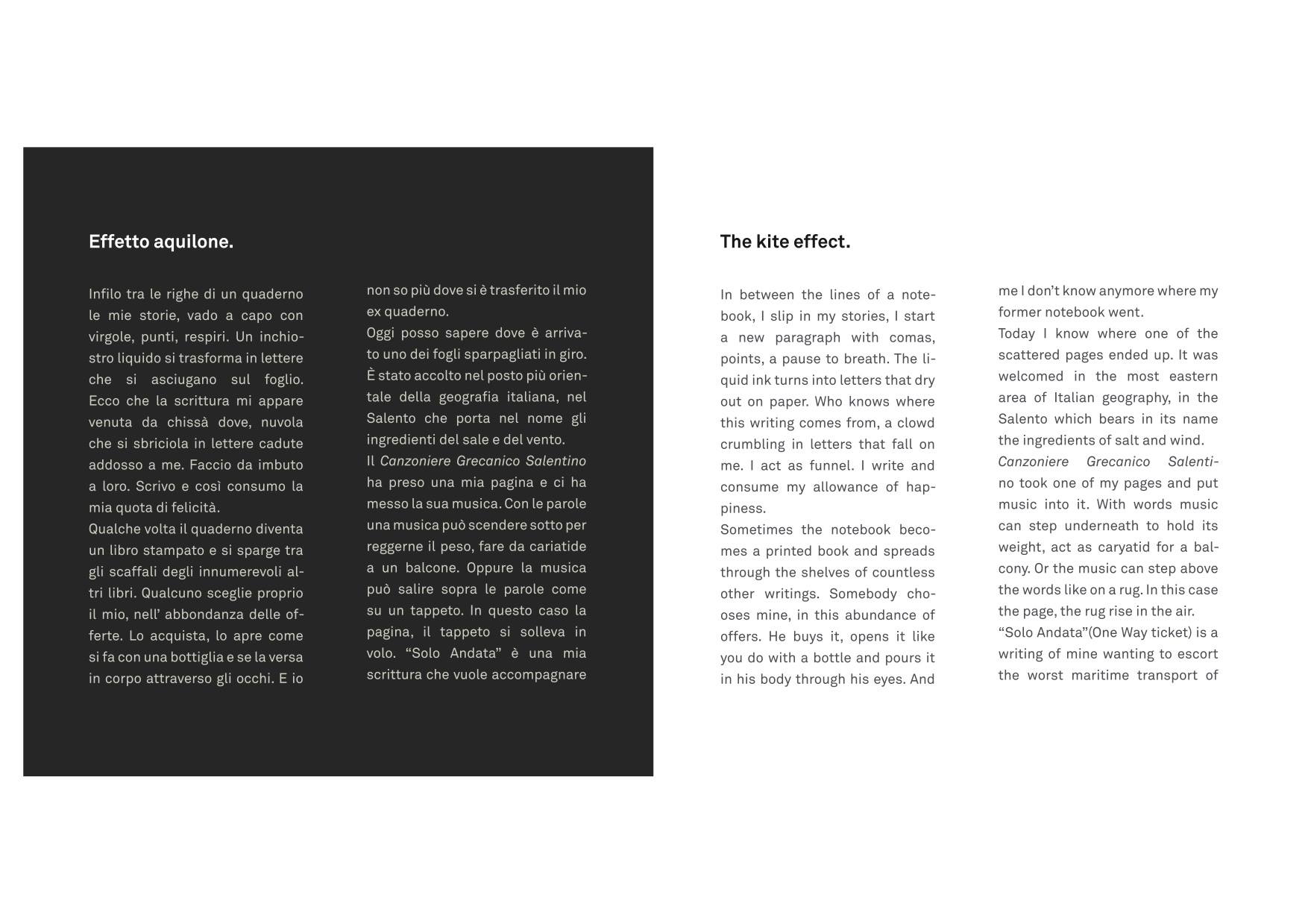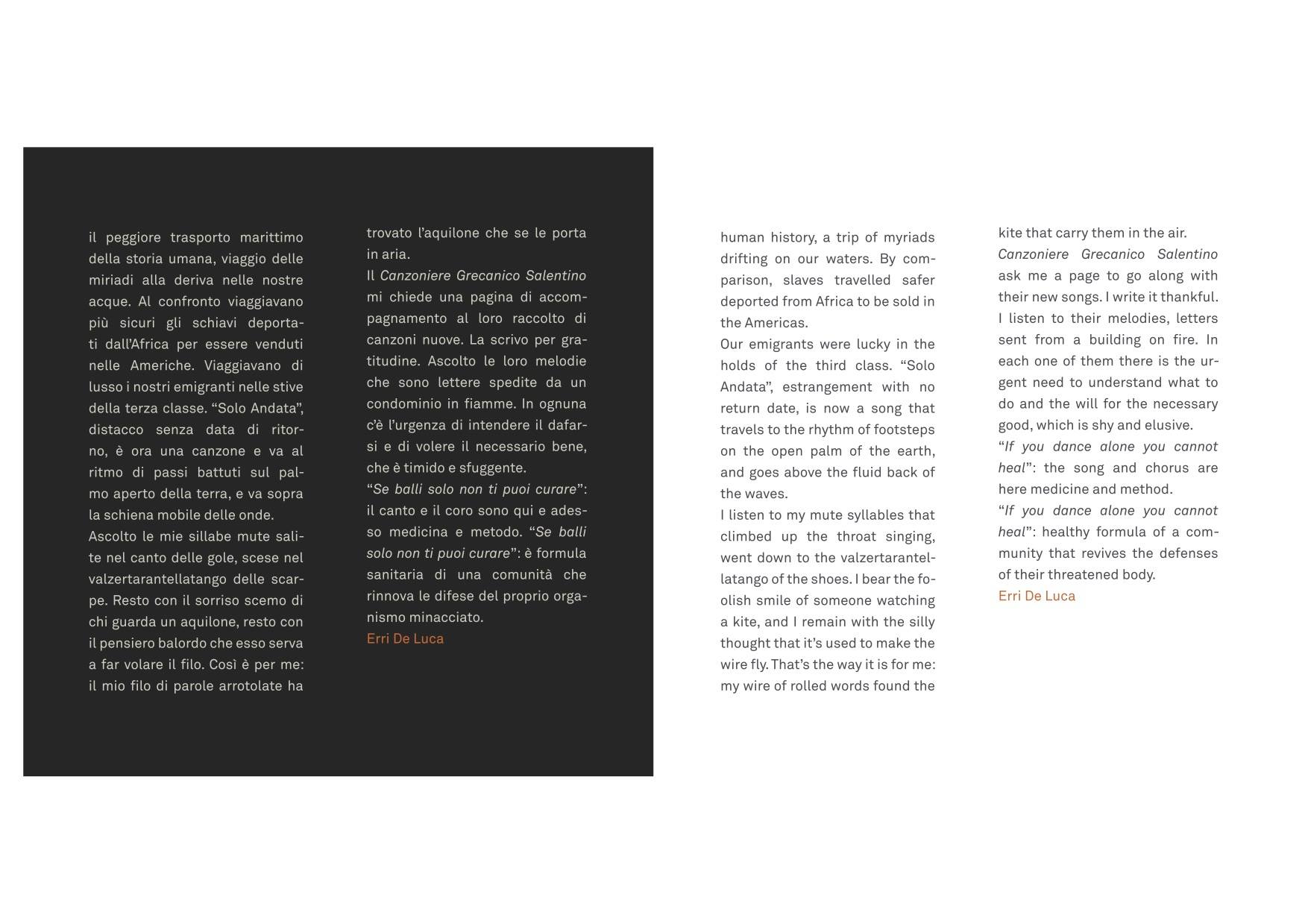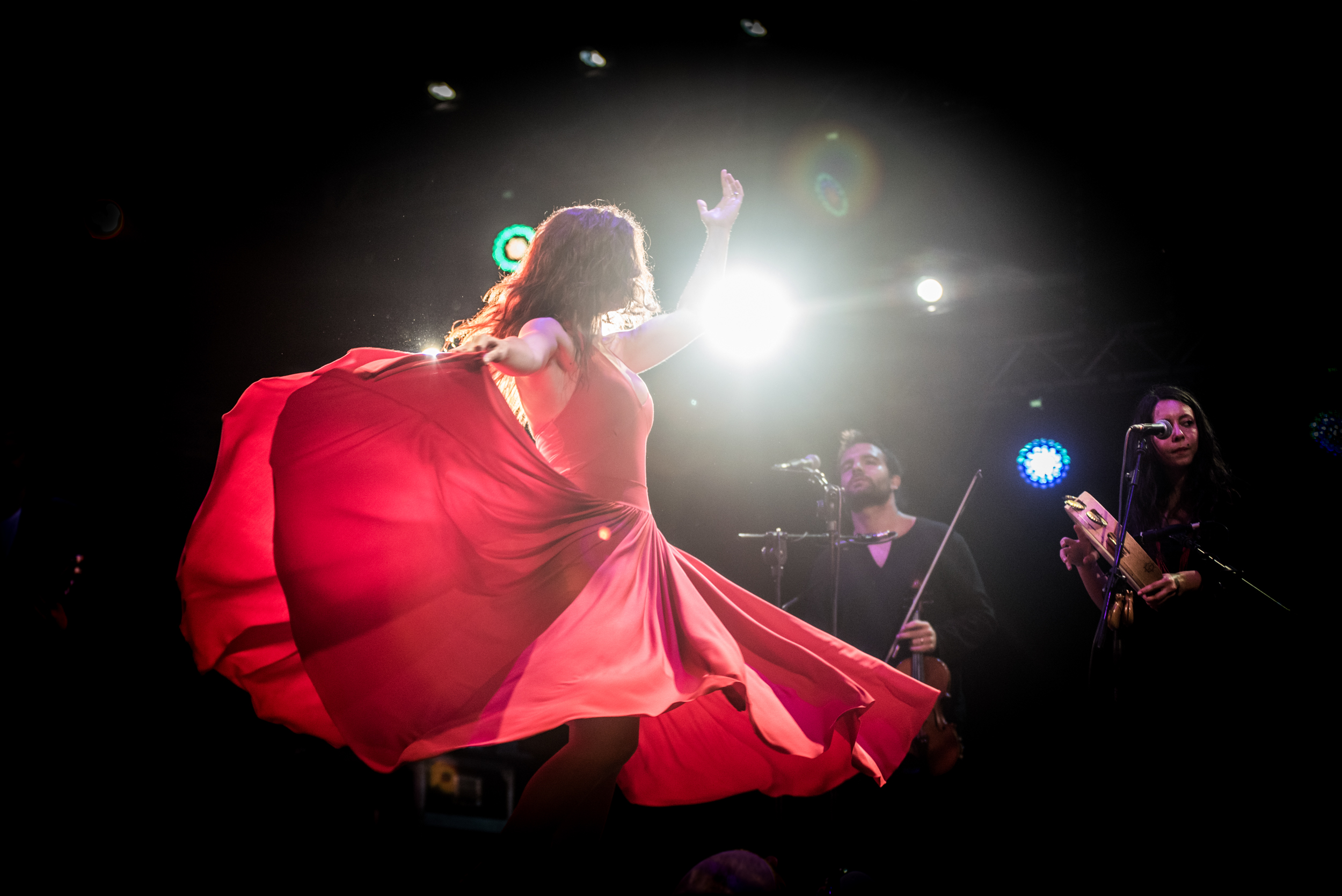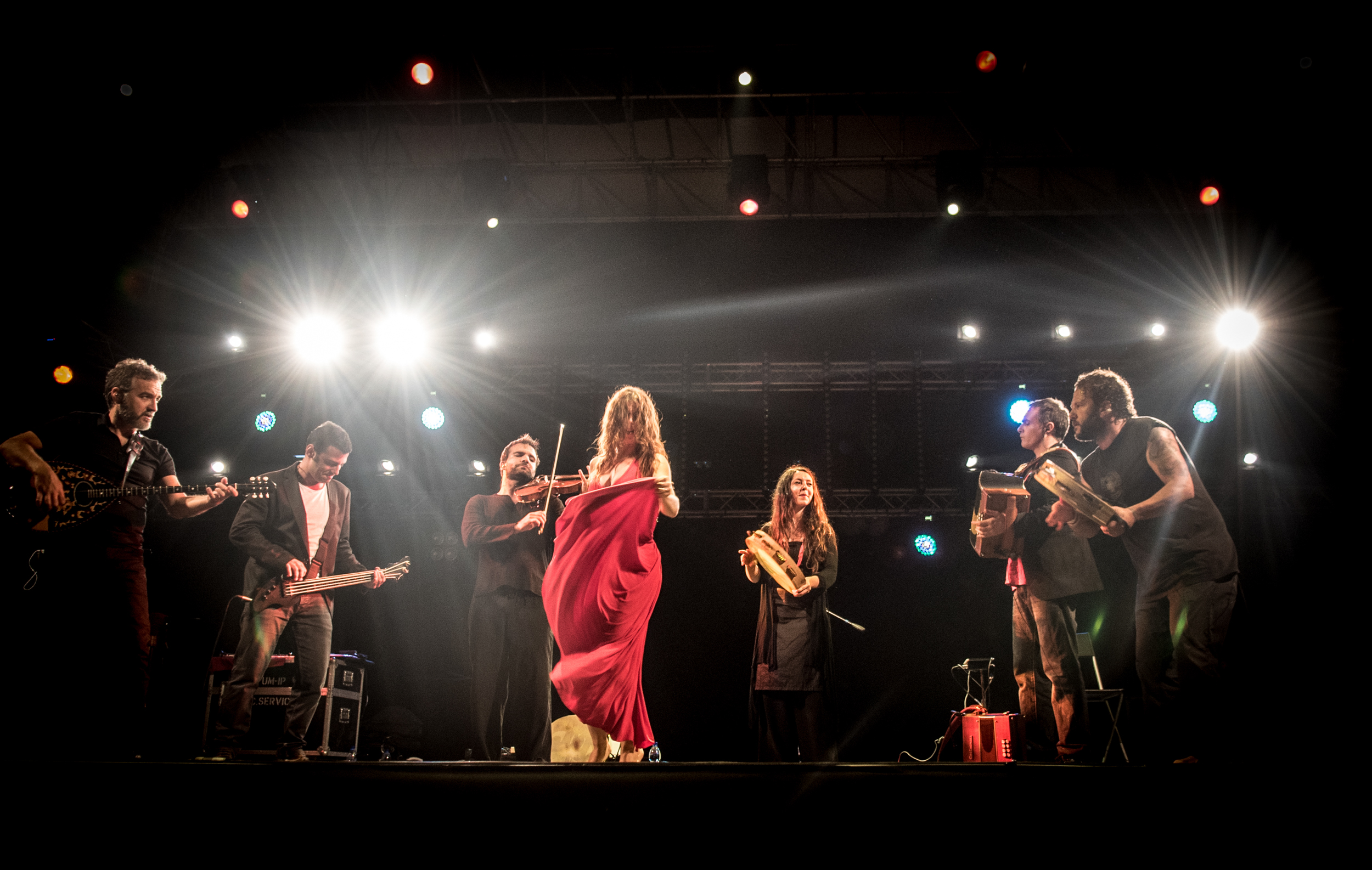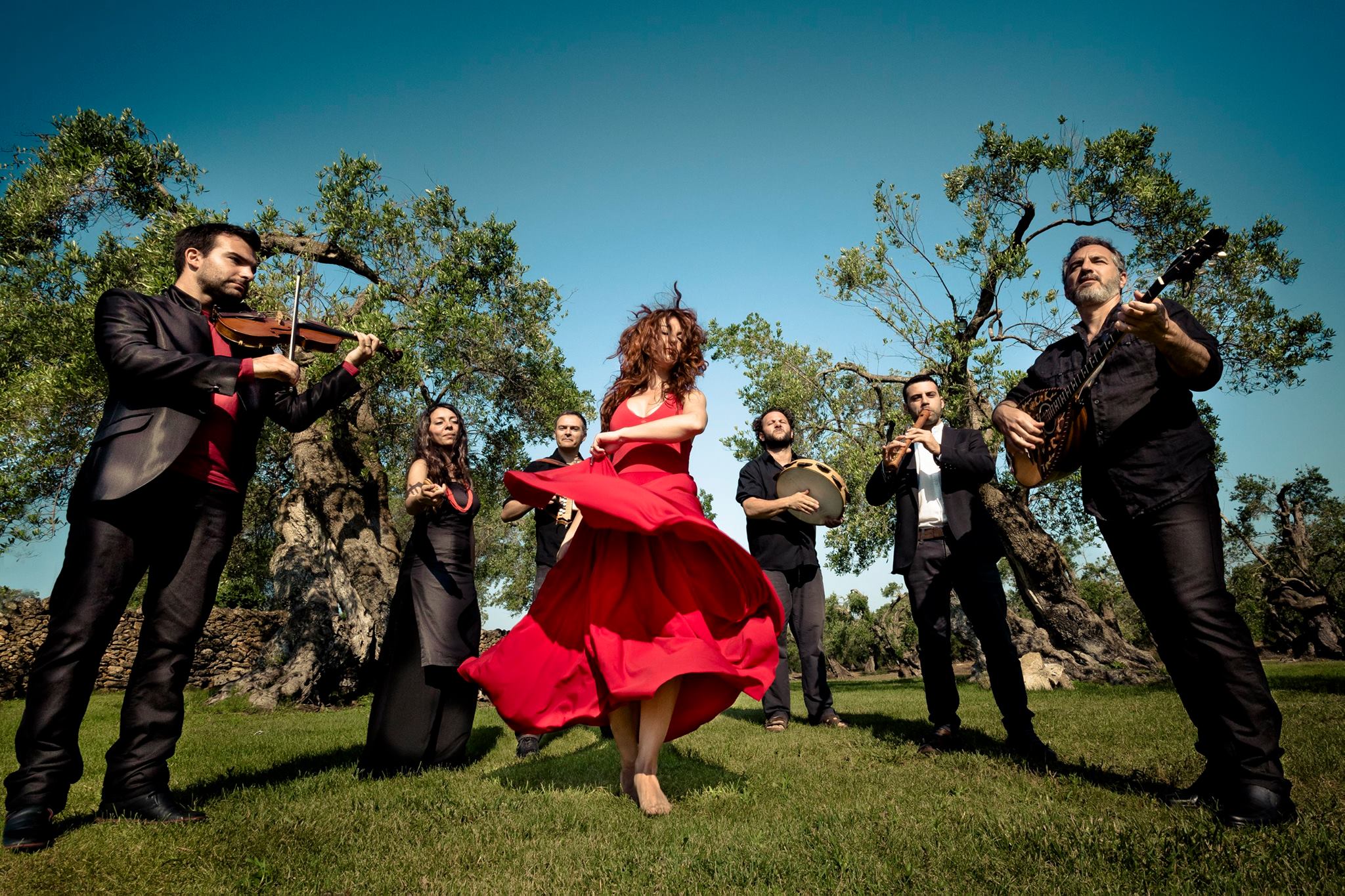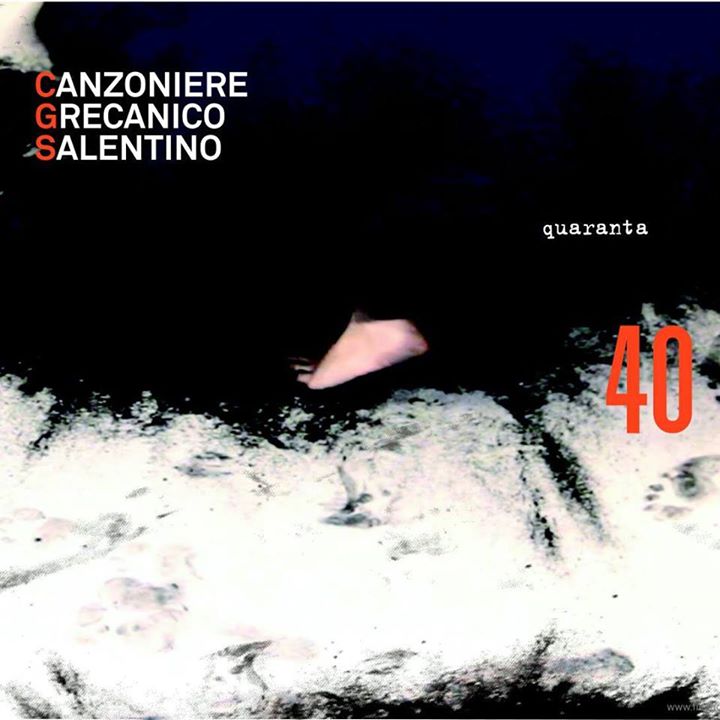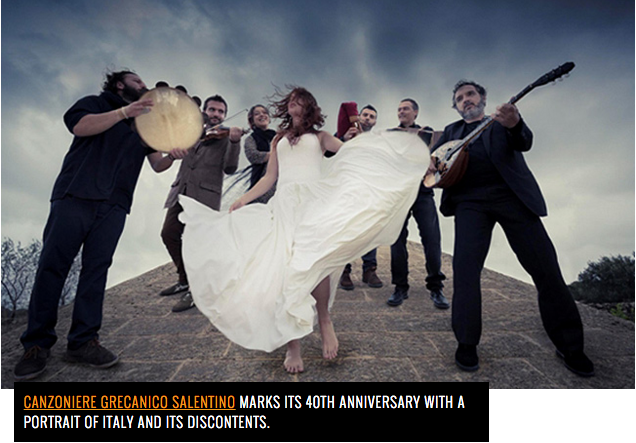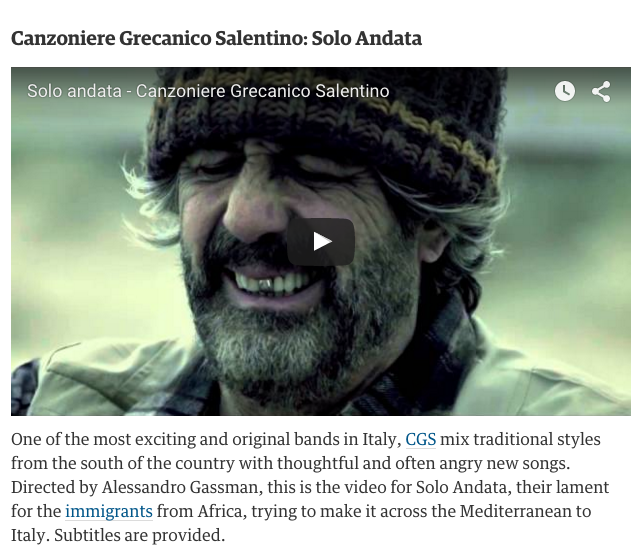una delle firme piû celebri della critica musicale italiana, Gino Castaldo, scrive del nostro Quaranta su la Repubblica!
Categoria: Review
Effetto aquilone, Erri De Luca
the Telegraph: Cambridge Folk Festival, review.
Anche per il The Telegraph il nostro show è stato uno dei momenti di spicco al Cambridge Folk Festival!
The Telegraph put our show among the standout moments of the Cambrige Folk Festival!
The Guardian celebra il nostro show al Cambridge Folk Festival!
The Guardian celebra il nostro show al Cambridge Folk Festival!!
“a stirring performance from the Italian pizzica band Canzoniere Grecanico Salentino, with their hypnotically powerful dance style”
“Una performance entusiasmante dal gruppo Italiano di pizzica CGS, col loro stile di danza iponticamente potente”.
Música para espantar os males de hoje
Se a pizzica original tinha por finalidade curar as vítimas de ataques de tarântulas, a recuperação desta música (que também é dança) pelo Canzoniere Grecanico Salentino destina-se a exorcizar os demónios contemporâneos. Esta sexta-feira, a cerimónia acontece em Sines.
Apesar do aspecto ameaçador, mercê do tamanho e do pêlo, as tarântulas não são propriamente letais para os humanos. Ninguém fica paralisado ou a espumar da boca, nenhuma glote se contrai e asfixia, não há registos de quem tenha sucumbido às dores provocadas por uma picadela de tarântula. Na pior das hipóteses, com aquele seu peculiar hábito de esfregarem as patas no abdómen, produzem uma irritação cutânea de levar ao desespero qualquer humano que tenha o azar de ser tomado por predador.
Terá sido certamente essa reacção alérgica capaz de despertar uma gesticulação desvairada, ajudada por alguma mitificação, a fazer da tarântula a culpada das dores físicas (talvez sobretudo psicossomáticas) que se associam, na zona de Salento, Sul de Itália, ao comportamento possuído que era preciso exorcizar e expulsar através de um ritual efectuado ao som da pizzica. Maioritariamente mulheres de classes mais baixas (as tarântulas tinham uma padrão para os seus ataques), as vítimas salentinas prestavam-se então ao tarantismo, cerimónia destinada a livrá-las, com recurso à música e à dança, de todo o tormento que as acometia. “A pobre condição física ou psíquica encontrava muitas vezes no tarantismo uma forma de expressar o seu sofrimento”, explica ao Ípsilon Mauro Durante, líder do colectivoCanzoniere Grecanico Salentino, que esta sexta-feira se apresenta no Castelo de Sines, em mais uma edição do Festival Músicas do Mundo. Sabe do que fala porque a música que cria parte justamente de uma exploração da sonoridade da pizzica. “As pessoas podiam, através do ritual, dar a saber a toda a gente que estavam em sofrimento e que não queriam ser abandonadas. Hoje é um pouco diferente porque a dor e o sofrimento não são fáceis de partilhar socialmente e, regra geral, conduzem até ao isolamento.”
Mauro Durante concorda que há na pizzica e no tarantismo elementos comuns ao gnawa marroquino ou até mesmo ao vudu togolês e às cerimónias xamânicas sul-americanas. “(…) uma forma de sentir que pertencemos a uma comunidade e que estamos juntos”
Daí que a missão do Canzoniere Grecanico Salentino nunca tenha passado propriamente por contribuir para a cura de alguma senhora transtornada por uma ferroada de tarântula. Desde que a formação foi originalmente formada pela poetisa Rina Durante em meados dos anos 70 que a missão do grupo se centra na recuperação de uma tradição salentina, ao serviço não de um popular prontuário terapêutico mas da expurgação de outros males do espírito. Quando Daniele Durante, pai de Mauro, procurou Rina, informado de que a poetisa pretendia formar um grupo mas não cantava, não tocava nenhum instrumento e não dançava – o seu contributo era o enunciado teórico que lhe serviria de rastilho –, ignorava ainda que se iria encontrar com uma prima. O Canzoniere, de certa forma, afirmar-se-ia uma banda familiar, tendo Mauro sido investido pelo pai, em 2007, na condição de novo director musical do grupo.
A primeira decisão que tomou replicava, de certa maneira, o gesto fundador da primeira formação do Canzoniere: ao reconhecer na política do grupo o dever “de não olhar para a tradição de música e dança como algo que representa o passado”, susceptível de ser fechado atrás de uma vitrina de museu só do interesse de turistas obsessivos, ou de ser retratado num postal amarelado de uma época de charme incerto, foi à procura dos melhores músicos de pizzica da região da Apúlia (de que faz parte a Península Salentina, o salto “da bota de Itália”) e recrutou ainda outros “estranhos” que pudessem trazer alguma novidade ao som da banda. Depois, foi apenas aplicar a mesma regra às canções e dotá-las de letras que falassem para o presente salentino, não perdendo assim a missão de se incrustar na vida quotidiana do seu povo.
Os demónios actuais
É por isso que em Quaranta (álbum lançado já este ano e comemorativo do 40.º aniversário do colectivo), ou no anterior Pizzica Indiavolata, podemos encontrar temas que versam a situação dramática dos migrantes mortos no Mediterrâneo em busca do território europeu ou a magnífica sátira contra a TAP – não se trata de uma mensagem de oposição à privatização da companhia aérea que opera em Portugal, mas antes de uma canção de resistência que se insurge contra o chamado Trans Adriatic Pipeline. Convicto de que em toda a Europa as vozes dos cidadãos são facilmente silenciadas após o voto na urna – “Não temos qualquer influência nos políticos e nas políticas, pelo que é importante encontrarmos formas de expressar as nossas opiniões”, argumenta –, Mauro Durante refere-se a estas temáticas como “os demónios actuais”. Sem esvaziar a pizzica da sua intenção primeira, o músico acredita que basta redireccionar a música para as causas de sofrimento actuais, como “a dificuldade para os jovens de hoje de levarem as suas vidas e encontrarem o seu lugar num mundo afectado pela crise e pela sobre-especialização”, e assim se manterá a valência curativa da pizzica.
Em Quaranta, álbum lançado já este ano e comemorativo do 40.º aniversário do colectivo, podemos encontrar temas que versam a situação dramática dos migrantes mortos no Mediterrâneo em busca do território europeu ou a magnífica sátira contra a TAP
“Ao mesmo tempo”, acrescenta, “pensamos que todos os sentimentos positivos que emanam da nossa música e da nossa dança são das coisas mais bonitas que se podem experimentar no mundo”. Daí que a “cura” exista também naquilo que Mauro Durante identifica como “o poder de eliminar distâncias”, e que é específico da dança: “Quando se dança com outra pessoa está-se ao mesmo nível, não importa a posição social, o sexo, a idade, tudo isso é achatado, pisamos o mesmo chão enquanto nos olharmos nos olhos.” É nessa dança em estado de transe, como se para expulsar um demónio fosse a própria música a possuir os corpos, que Justin Adams (guitarrista de Robert Plant, produtor dos Tinariwen ou de Rachid Taha, membro do duo JuJu com o gabonês Juldeh Camara) reconhece semelhanças com os rituais (e as músicas associadas) do Norte de África. Mauro concorda que há na pizzica e no tarantismo elementos comuns ao gnawa marroquino ou até mesmo ao vudu togolês e às cerimónias xamânicas sul-americanas. Mas o subtexto que pretende implicar nessa dança e nessa eliminação de distância é o de que possa descobrir-se aqui “uma forma de sentir que pertencemos a uma comunidade e que estamos juntos”.
Se na Europa actual o músico encontra uma ausência de “solidariedade espiritual, sobretudo com as situações dos migrantes e com o caso grego”, aposta na música e na dança para ligar novamente as pessoas. Talvez toda a essência da música do Canzoniere Grecanico Salentino possa ser, assim, destapada por um verso escondido algures na letra de Taranta: “Se foi uma tarântula/ não me abandones/ Se dançares sozinho/ não te podes curar”.
Quaranta is Top of the World for Songlines! 5 stars review from Ciro De Rosa!
ISSUE 109 – July 2015
Canzoniere Grecanico Salentino
Quaranta
Ponderosa Music & Art
Hide review
Puglia’s finest hit their 40s with no hint of a mid-life crisis
Quaranta, CGS’s new release, celebrates four decades of the group’s existence. It is awe-inspiring, stirring and soulful; with an array of acoustic instruments plus subtle keyboards, this septet of accomplished musicians (plus one dancer) have long been giving Salento traditional music a contemporary character. Take the standout work-song-style opener ‘Tienime Tata’, or the powerful account of migrants, seeking hope, trying to cross the Mediterranean that is ‘Solo Andata’. Or the rousing ‘No Tap’, on which Fanfara Tirana add weighty brass, or ‘Ziccate’, about local environmental devastations.
Producer Ian Brennan has captured the band’s sheer exuberance and straightforward sound. Thundering tamburelli percussion and driving fiddle by bandleader Mauro Durante (whose father co-founded the band in 1975), propel the organetto, guitar, bouzouki, bass, zampogna, ciaramella and flute, with Maria Mazzotta, Gianluca Paglialunga and Emanuele Licci’s voices displaying stunning diversity of timbre. There’s the bitter humour of the fizzing tarantella ‘I Love Italia’, featuring Piers Faccini, and the exotic-tinged ‘Taranta’, on which pianist Ludovico Einaudi pops up. Canzoniere Grecanico Salentino are contagiously spreading the rhythms of Puglia round the world.
Ciro De Rosa
TRACK TO TRY Tienime Tata
Canzoniere Grecanico, il folk salentino alla conquista dell’Europa
Ancora una fantastica recensione di Quaranta dalla prestigiosa penna di Guido Festinese!
E’ una questione di stile e di consistenza di fondo, forse: c’è chi invecchia senza paura di mettere in mostra magagne e fragilità, vedi alla voce Leonard Cohen, e chi si ostina a fare il giovane sboccato ed elastico per sempre, e son figure patetiche. Vero Mr. Jagger? Sia come sia, è un rischio che per fortuna non si corre nei territori ampi e variegati del folk progressivo, dove a volte i decenni che passano sono più un mero marcatore cronologico che una iattura con annesse complicazioni reumatoidi. In Inghilterra ad esempio succede con i magnifici Fairport Convention, da noi con una formazione palpitante e matura come il Canzoniere Grecanico Salentino. Che con Quaranta festeggia una storia iniziata nel 1975, quando sui palchi giravano Nccp e Musica Nova, e prosegue a tutt’oggi con eccellenti risultati: peraltro ben messi in rilievo anche dalla stampa internazionale, dal Guardian al New York Times. L’ensemble pugliese guidato dal vocalist, percussionista e violinista Mauro Durante qui trova modo di collaborare con gente diversa e ugualmente valida come Ludovico Einaudi, Piers Faccini, Alessandro Gassman, Erri De Luca, che regala uno dei suoi testi incendiari e dolenti. Si rinnova il piccolo miracolo di note che sembrano ataviche e sono di oggi, sono state appena messe al mondo, e hanno il profumo del tempo meditato. (Guido Festinese)
superb review of our Quaranta by the great George De Stefano on popMatters
Rhythm and Protest
On the world music scene, there have been few success stories in recent years as gratifying – and unlikely – as Canzoniere Grecanico Salentino (aka CGS). The band, from the Salento peninsula of Italy’s southern Puglia region, has been building an international fan base with a rigorous touring schedule that has taken them far beyond their home base, through Europe, North America, and to Australia and New Zealand. Critics praise their electrifying shows and first-rate albums. A recent review in fRoots (Folk Roots) magazine captured the critical consensus: “Do they live up to all the hype they’ve received? Hell, yes! Are they one of the best bands in the world at the moment? Without a shred of doubt”.
The core of the CGS sound is the pizzica taranta, a powerfully rhythmic, trance-inducing folk style that originated centuries ago in Salento as a ritual healing music. Pizzica was played to cure the victims of tarantismo, a state of physical and emotional distress supposedly caused by the poisonous bite of a tarantula. While a small group, usually comprising violin, button accordion, and tambourines played and sang, the “bitten” danced themselves into a frenzy until they collapsed, purged of the spider’s poison. Tarantismo emerged among peasants, landless farm workers and manual laborers, with most victims of the spider’s bite being women, who lived under a stifling and sexually repressive patriarchy.
As the anthropologist Ernesto de Martino observed in his famous study, The Land of Remorse, tarantismo was a cultural response of marginalized people to a “crisis of presence”, a disorientating sense of lacking power – what we nowadays call “agency” – to cope with stressful psychological and social conditions. The religious-magical rituals oftarantismo gave sufferers catharsis, helping them heal (if only temporarily) feelings of loss and alienation brought on by the crisis of presence.
Tarantismo died out in Salento decades ago; what has survived is its music. In Italy during the ‘70s, young, left-wing musicians led a folk music revival that rediscovered – and championed – old and often disparaged idioms. In 1975, a leftist writer, Rina Durante, and her cousin Daniele, a singer and guitarist, launched a pizzica revival when they founded Canzoniere Grecanico Salentino. (The band’s name means Salentine Greek Songbook, referring to the ancient Greek roots of Salento’s folk music.) In 2007, Daniele turned over the leadership of CGS to his son Mauro, a virtuoso violinist and percussionist. The second-generation band has released the albums Focu d’amore (2010), Pizzica Indiavolata (2013), and now Quaranta, its title a nod to the band’s forty-year existence.
Justin Adams, a guitarist in Robert Plant’s Sensational Space Shifters, has worked with CGS members and other Salentine musicians. He observes that pizzica “is not as four-square as most European folk music. It’s got something of Africa in it”. By that, Adams means the emphasis on rhythm and repetition to induce trance states. Those elements are in place on Quaranta, but there’s a difference from past recordings – some tracks are more “folk music” than pizzica taranta. “Pu e to rodo t’orio” (Where is the beautiful rose?) has lyrics in Griko (an ancient Greek once widely spoken in Salento), but the music, by bouzouki player Emanuele Licci, sounds inspired by Appalachian folk. This likely has to do with producer Ian Brennan, who twice won Grammys for Best Traditional Folk albums, and, in 2012, a Best World Music Grammy for Tassili, by the Tuareg band Tinariwen.
If Brennan’s production leads the band in some new directions, Quaranta nonetheless has all the qualities that captivate CGS fans: drama and mystery, intense emotion and soulful melancholy. But this time there’s something else: anger, even rage. Italy’s folk music traditions include protest songs, and there are some great ones on Quaranta that take on environmental destruction, poverty and unemployment, and immigration (past and present). “No TAP”, written by Daniele Durante and sung by Emanuele Licci, with horns from the Albanian brass band Fanfara Tirana, sounds comic, even carnivalesque. But there’s no mistaking the band’s displeasure over the Trans Adriatic Pipeline (TAP), a massive project to transport natural gas from Azerbaijan to Europe. In Puglia, community activists, and both local and regional government, have opposed the TAP as bad for the environment and area economies, but the national government has ignored the protests. Durante’s lyrics personify the TAP as an arrogant deity of “the religion of gas”: “Debate topics / the sick and the elderly / what you do and what you say / I don’t give a fuck / because I’m the tap”.
“Solo Andata” (One-Way Ticket), with lyrics by the Neapolitan writer Erri De Luca (currently on trial in Italy for allegedly encouraging sabotage of the TAP), deplores the plight of today’s desperate migrants to Italy, making connections to the experience of the impoverished southern Italians who emigrated during the late nineteenth-early twentieth centuries. “Ziccate” (Hold On) shifts between two viewpoints: that of a grandson of farm workers who has gotten rich dumping toxic waste in the fields his forbears worked, and an opposite one – his guilty conscience? – that acknowledges, “What the ancients left us / without any shame we ruined”.
“I Love Italia” indicts contemporary Italy by contrasting romantic images with ugly reality: “You go for a walk / beauty till you swoon / you’re dreaming of Fellini / kissing at the fountain / just behind the scene / rubbish like a mountain”. “Italy’s a treasure”, the band sings, “but all of us are broke / Mona Lisa’s smiling / but we don’t get the joke”. The chorus couldn’t be more sardonic: “Spaghetti, pizza, mandolino – O mamma mia, I love Italia!”
Quaranta paints a dark portrait of today’s Italy (even the love songs are tinged with sorrow), and of the state of its people, native and immigrant, who are experiencing their own crises of presence. But it does so in vibrant, richly colored sound. CGS boasts three terrific lead vocalists – Giancarlo Paglialunga, Maria Mazzotta, and Emanuele Licci – who weave stunning polyphonic harmonies, with Mauro Durante often joining in. (Paglialunga also is a master percussionist.) Diatonic accordionist Massimiliano Morabito and multi-instrumentalist Giulio Bianco are invaluable assets, the first an exceptional soloist and accompanist, the latter a versatile colorist. With Quaranta, Canzoniere Grecanico Salentino, a band rooted in the past but thoroughly contemporary, has made an outstanding album that feels both of the moment and timeless.
